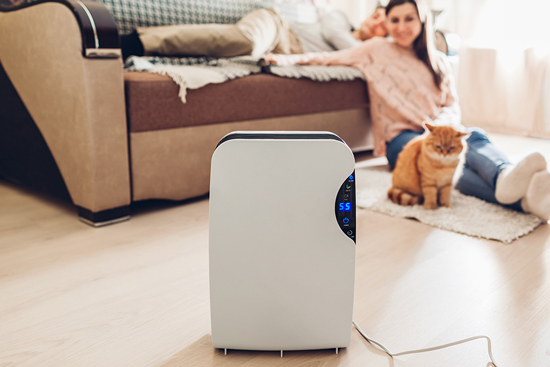|
More and more people are becoming aware of the fact that indoor air is often even more contaminated than the air outside. Many have turned to air purifiers in order to try to correct this issue. Are air purifiers worth the investment, and do they really work to make indoor air cleaner and healthier? Let’s take a look.
Air Purifier Basics
Air purifiers work by sucking in the nearby air, circulating it through the unit, and trapping any dust, pet dander, mold spores, pollen, smoke particles, and other contaminants inside of the unit’s filter. The clean air is then pushed back out into the space.
Note that air purifiers can only capture particles that are floating around, and not after they have settled on the floor or other surfaces. Also, a smaller and more affordable air purifier will be limited in how much space it can clean, but the benefit is that they are often very portable and can be moved from room to room.
Air Purifier Costs
Air purifiers can cost anywhere from $100 to $500 or more, depending on the model you choose. Replacement filters are an additional cost to factor in. They can cost from $20 to $50 each and need to be replaced roughly every three to six months. Alternatively, you can choose a model with a reusable filter. Running the air purifier may also increase your energy bill, though you can minimize costs with an Energy Star certified model.
As air purifiers do require a modest financial investment, you want to make sure that getting one is the right choice for you.

Who Can Benefit Most from Air Purifiers?
By removing allergens and other contaminants from the air, air purifiers often make a noticeable difference for allergy and asthma sufferers. They can help transform your home into a place where you find relief from your symptoms. They can also be beneficial for family members who are more prone to illness and infection by trapping airborne bacteria.
People who are generally otherwise healthy and don’t suffer from allergies or asthma likely won’t notice much of a difference in their home’s indoor air. However, some do consider the peace of mind that comes with knowing their indoor air is less contaminated to be worth it.
Air Purifiers as Supplemental Tools
While air purifiers do have their uses and benefits, it is best to think of them as a supplemental tool rather than a complete solution to indoor air quality issues. The most effective way to improve indoor air quality is to regularly ventilate with outdoor air by opening windows and doors and by using your home’s exhaust fans. You should also focus on keeping your HVAC system well maintained and on frequent vacuuming, preferably with a vacuum fitted with a HEPA filter. Air purifiers can help bolster your efforts and are particularly useful during the winter when it isn’t as easy to ventilate your home.
By carefully considering the benefits of an air purifier, you can make an informed decision about whether or not getting one is right for you. Any steps you take to improve indoor air quality will contribute to better overall health and wellness for the whole family.
|